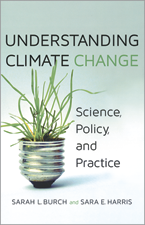
Sarah L. Burch & Sara E.
Harris.University of Toronto Press, 2014; 307 pp;
ISBN: 978-1-44261-455-1.
by Howard A. Doughty
The ecological degradation of the biosphere resulting from anthropogenic climate change, the intensity of the scientific research into this phenomenon and the bitter debates provoked by the anti-science lobby and “populist” politicians (enabled by fossil fuel industries) have made arguments about global warming increasingly passionate, obdurate and confrontational.
Meanwhile, more destructive hurricanes, more powerful tsunamis, and more intense floods, draughts and wildfires result in almost unprecedented wildlife extinctions, the prospect of the destruction of sea-level cities, and ever more massive human dislocation combine to make the topic among the most ferociously contested in our already distressing political discourse.
Moreover, the speed with which new empirical evidence is accumulating to describe and analyze the transformation of the planet with greater depth, breadth and precision is daunting, even for experts in the related fields — never mind professors, public intellectuals, journalists and attentive citizens compelled to resist and overcome the voices of irrational denial.
So it is that perhaps the most superficially disturbing fact about this book is its publication date: 2014. At a time in which today’s headlines are already yesterday’s news, a book resulting from a manuscript written over three and maybe as long as five years ago may invite the criticism that it isn’t sufficiently up-to-date. That judgement would be unfair.
Burch and Harris have produced a “primer” for students and a reminder for professionals in environmental science, public policy and the politics of climate change. It is sturdy, comprehensive and well-informed. It is, in that weakest of compliments, “accessible,” but it is not simplistic. It speaks clearly, not condescendingly. It effortlessly connects scientific theory, empirical knowledge to the worlds of governance, political economy and the critique of ideology.
As befits a volume meant for educational purposes, Understanding Climate Change is calm and deliberate in exposition. Although modern society is exterminating plant and animal species at a rate approaching the Cretaceous-Tertiary extinction in which the dinosaurs and about 75 per cent of all terrestrial species died out about 65 million years ago, Burch and Harris plainly and patiently offer non-scientists an engaging bridge to rigorous research into the fate of the fashionably labelled anthroposphere. They concurrently acquaint natural sciences with the morals and methods of people involved in translating hard science into workable solutions to the greatest threat to human civilizations.
For people dazed and baffled by apocalyptic prognostications of unrelenting catastrophists, Understanding Climate Change may even prove energizing. Without discounting the “existential” threat to our species and the devastation already wrought upon others, Burch and Harris trade in thoughtful erudition with no trace of demagoguery, but with the kind of light touch that can be refreshing in presenting a narrative that can otherwise become cumbersomely didactic, annoyingly pedantic and dysfunctional hyperbolic.
So, better than most polemicists, they tether the passions of zealotry to the ground of empiricism and pragmatism. As Canada’s beloved conservative philosopher George Grant said within my hearing at a “teach-in” in a Toronto ice hockey rink a little over 50 years ago, “moral outrage is too precious a commodity to be used in the service of reality.” Burch and Harris elucidate a great deal of reality. They cover topics from the basics of systems analysis to climate change mitigation and from climate models to strategies for biodiversity maintenance with confidence and aplomb — all the while giving readers the necessary tools to translate indignation into effective action.
“Fair and balanced” is a phrase sullied by its appropriation by one of the more egregious broadcasting corporations now deforming the discussion of climate change and much else; yet, it is a description that can be unapologetically applied to this honest, masterful book. And, since the science is so well-conducted that it would be (and is) perverse to withhold at least tacit agreement that climate change is “real” and that we are accountable for it, no overwrought contentious rhetoric is needed to persuade an open-minded sceptic about what’s happening and how we can moderate our most toxic habits and ultimately (just perhaps) redeem ourselves.
Howard A. Doughty teaches English and liberal studies courses at Seneca College in Toronto.